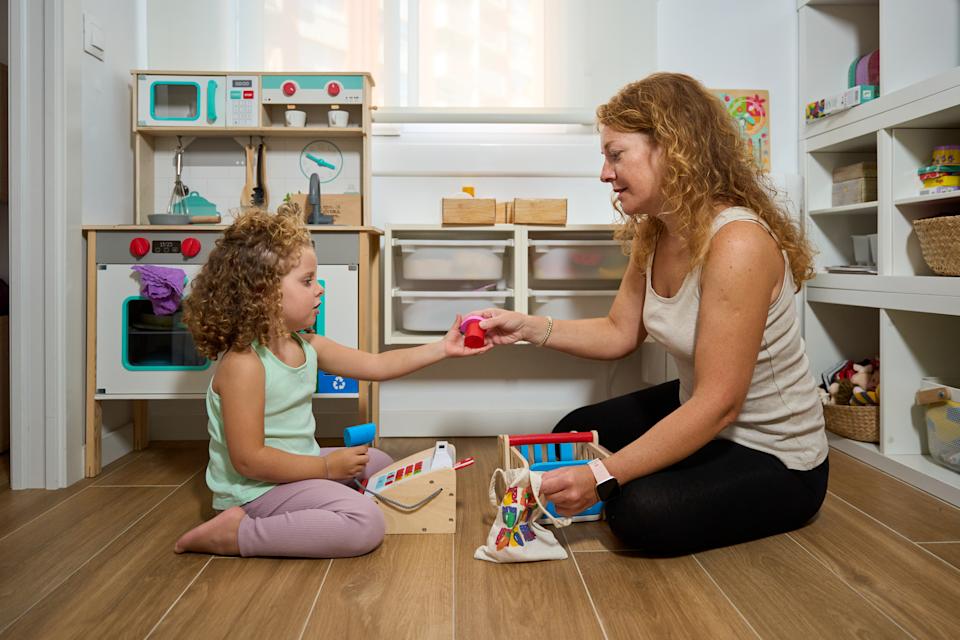Presenter Miquita Oliver has opened up about going bankrupt aged 27. In the latest episode of her Miss Me? podcast with Lily Allen, she explained how she was stung with a £170,000 bill after not paying her taxes for three years.
Now 40, the T4 star reflected: “I knew nothing about tax – absolutely nothing. I come from parents who know nothing about tax. They didn’t think to ask me whether I was paying tax on the money that I was earning, and I was earning a lot of money. I didn’t ask.”
Although she had an accountant who advised her to set aside money for that purpose, she says she “just stopped doing that” after a while.
Oliver isn’t the only one to have a gap in her knowledge about personal finance, though. According to a recent study by Virgin Money UK, only 6% of 16-24-year-olds said they learnt about finance at school, while 43% of that same age group said they receive their financial education through social media or online resources.

How much are you teaching your kids about money management? (Getty Images)
The same research also revealed that those in Scotland (73%) were the most financially knowledgeable, while those in the West Midlands were the least. Surprisingly, London – aka, the financial hub of the UK – only ranked ninth, with Londoners only understanding 67% of the terms presented to them.
Although financial literacy education became a part of the National Curriculum in 2014, it is only taught as part of the broader citizenship lessons in key stages three and four (ages 11-16). Free schools and academies are under no obligation to follow the National Curriculum, though many do.
7 things to teach children about personal finance
Money coach Talia Loderick tells Yahoo UK: “We’re setting young people up to fail when we usher them into adulthood without the knowledge and tools to manage their money. We must do better.
“Whether you have a little or a lot, helping the children in your life develop the skills, knowledge, attitude and behaviours to manage money well is key.”
So, what can parents do to ensure their kids are set up for the real world, and learn about money management before they leave home?

Play shop with them. (Getty Images)
For younger children:
1. Start counting, using money and try role play
Loderick suggests that from the age of about three, parents should start teaching their children how to count, and about different denominations of money.
By playing shop and getting them to interact with money (even if it’s fake), they will start getting to grips with the concept of money management.
2. Get them involved in your weekly shop
When your kids are slightly older, Loderick advises beginning to get them involved in your weekly grocery shop. She says: “Shopping trips help show them both spending and saving habits.”
Whether you ask them to write out a list of what you need before you leave the house, give them a budget and task them with finding items in that price range, or you discuss why sometimes you may need to pare back on non-essential items, it will help them learn money management.
3. Introduce pocket money
According to Loderick, the best time to start giving your kids pocket money is when they reach seven or eight. Not only will they feel a sense of responsibility and pride, they can start thinking more critically about how much they spend – and what they spend it on.
If you set up a rewards-style approach, whereby they have to complete certain household chores before they get their pocket money, it can also help instil a good, solid work ethic in them.
In terms of how you give them the money, that’s up to you. It could be good old-fashioned cash or you might want to consider a prepaid debit card or an app, such as NatWest Rooster Money, GoHenry or HyperJar. This allows children to spend – and offers parents oversight.
The Money Saving Expert’s guide to the best prepaid debit cards for under-18s is a useful resource.
4. Use savings jars and money banks
A tip from Barclays bank is to have physical savings jars or piggy banks. Set out a clear goal or reason for saving, and encourage children to put money away either on a weekly or monthly basis.
This is also good practice when they start to get pocket money, as you can give them the option of either spending their money when they first receive it, or adding it to the savings jar so they can spend the accumulative amount.

Set up a bank account for your teen. (Getty Images)
For teens:
5. Go with them to set up their first bank account
In order for children aged 11-15 to open a current account or a savings account, they must have parental oversight.
Go through the different account types available (you can pop into your local bank branch for their help on this), and discuss the goals of each. For example, should they open a junior ISA account to lock money away for the future, or will a straight-forward current account suffice for their financial needs?
Most banks do not offer overdrafts on children’s bank accounts, so they can only spend what they have in their accounts.
6. Discuss ways to protect them from fraud
While our kids may seem more tech savvy than us these days (because, by and large, they are), it’s still important to warn them about the risks of online scams and bank fraud.
The Money Helper website advises parents teach kids to:
-
Create strong passwords which they share only with you
-
Never share their personal details with others or online
-
Only use well-known apps, website and games – and avoid things like in-app purchases
-
Be cautious about opening links, especially if they’re shared by an unknown source
-
If it sounds too good to be true, it probably is
-
Show you messages asking them for money so you can help determine whether they are fraudulent
7. Explain borrowing, mortgages and taxes
Before kids leave home, it’s really important to discuss how to manage their finances as adults. That could be in the form of student finance if they’re heading to university, investing and credit cards, or income tax and self-assessment.
Ideally, they should be aware of or understand the following before they start living independently:
-
Basic money management skills
-
Borrowing, loans and interest rates
-
Credit – including buying things on credit, credit scores and credit cards
-
Understanding payslips and tax
-
How to save and the importance of saving
-
Paying bills
-
The potential risk and reward of investing
Additional resources
Read more about parenting
